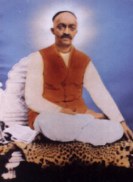Narayan Maharaj
Narayan Maharaj was born on 20th May 1885, at Bagalkot in Karnataka. His early childhood was full of calamities. He lost his father, when he was hardly 14 months old and lost his mother when he was four. As a worldly duty his grandmother looked after him. His sacred thread ceremony was performed at the age of nine. His grandmother was planning to appoint Narayan as her heir, but it created problems with the other relations and he was also not interested in any material acquisition. He left his grandmother's place and all his relations, as he was keen on establishing the only relationship with Lord Dattatreya. After leaving home he took rest for the night in Shiva's temple, but no one came to enquire about him.This proved to be an important event to break all the worldly ties for him. Whatever is destined to take place must take place. Suffering is a great blessing in disguise, it has the ultimate objective to bring sufferer on the path of love and realisation.
His life was full of hardships, trials and traumas but he had the absolute and unflinching faith and devotion for Lord Dattatreya, hence he had no fear of any kind.

